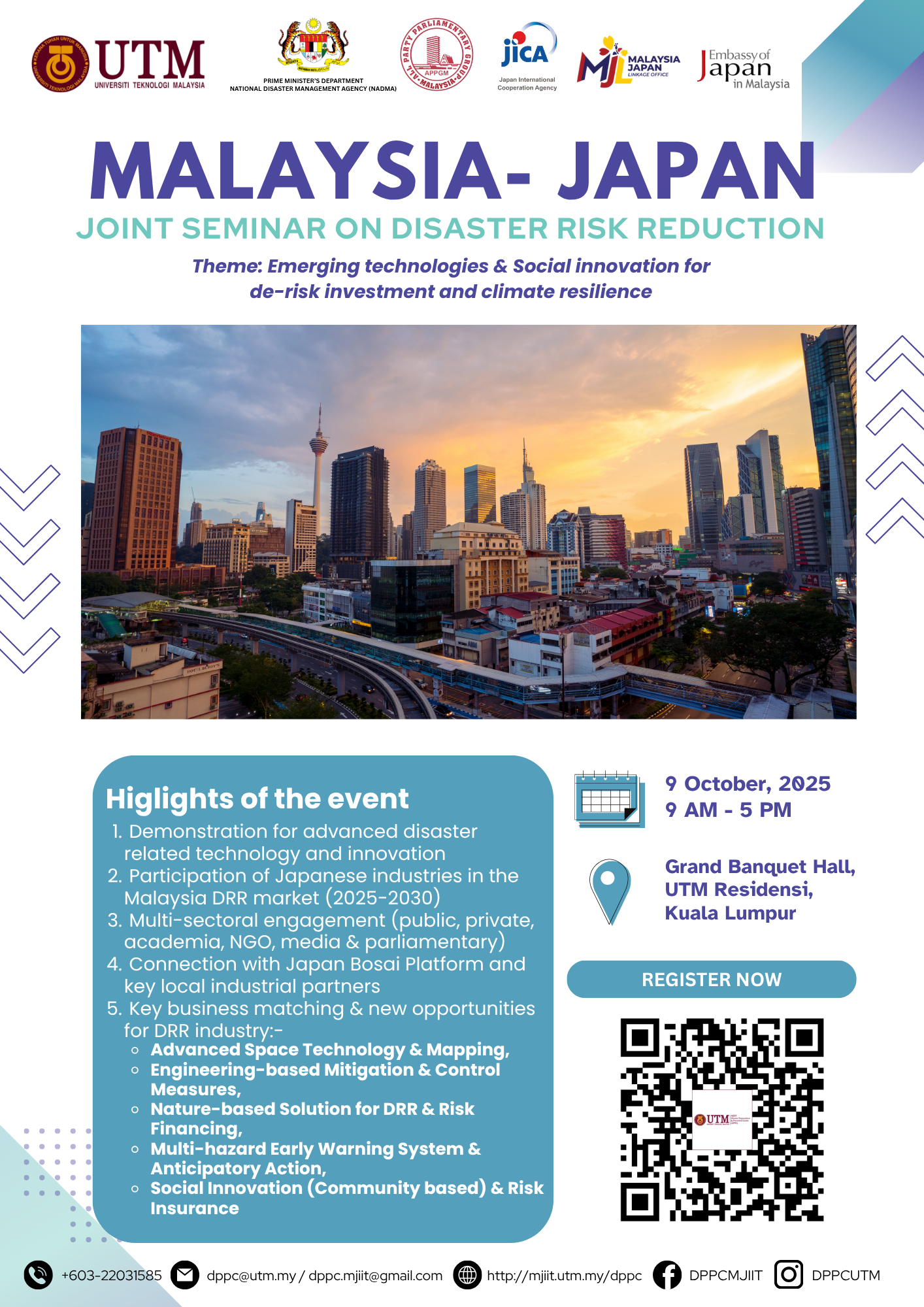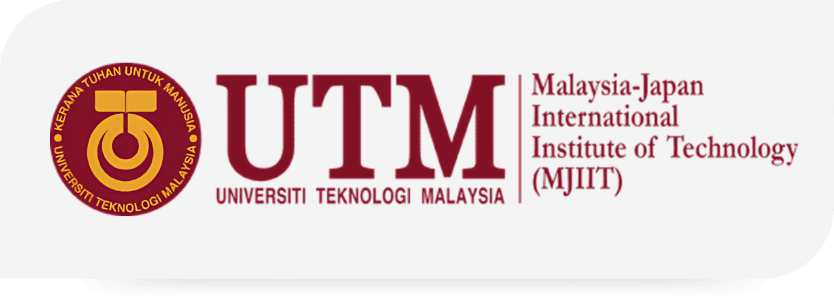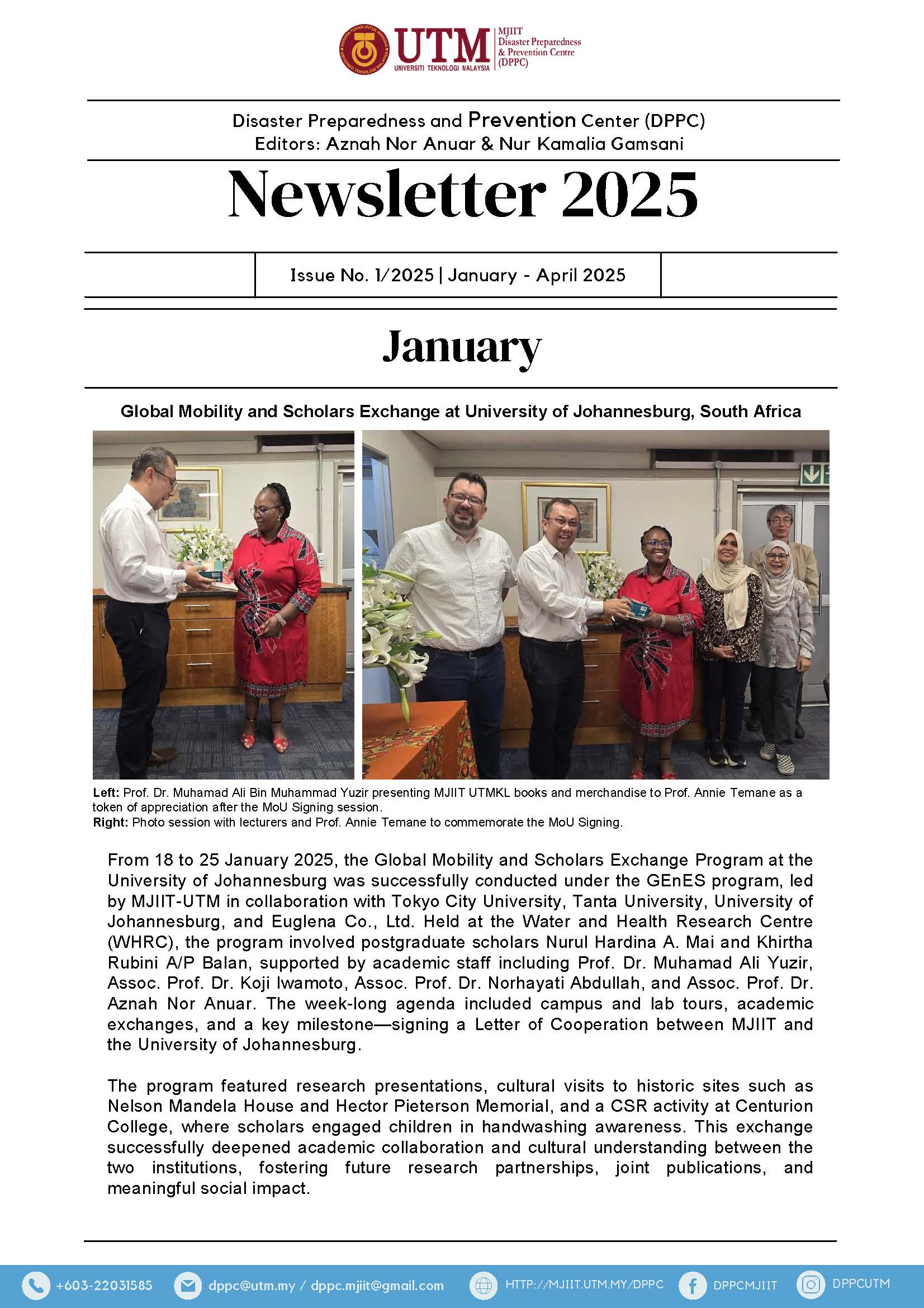Malaysia-Japan International Institute Technology (MJIIT)
Disaster Preparedness and Prevention Centre (DPPC)
A leading disaster risk reduction and management (DRRM) institute in multi-hazards and climate change to strengthen community.
Basic Information
- iKohza Name: Disaster Preparedness and Prevention Centre (DPPC)
- Leader's: Sr. Dr. Shuib bin Rambat
- Deputy Leader: Assoc. Prof. Dr. Aznah binti Nor Anuar
- Main Contact Email: dppc@utm.my
- Location/Office: Level 2, Malaysia-Japan International Institute of Technology (MJIIT), Universiti Teknologi Malaysia Kuala Lumpur

Malaysia-Japan Joint Seminar on Disaster Risk Reduction (MJ-DRR 2025)
Theme:
Emerging Technologies & Social Innovation for De-risk Investment and Climate Resilience
BACKGROUND
In an era marked by increasing frequency and intensity of natural disasters, the importance of international collaboration and knowledge exchange in disaster risk reduction (DRR) has never been more critical. The Malaysia-Japan Joint Seminar on Disaster Risk Reduction (MJ-DRR 2025) stands as a strategic platform to foster deeper cooperation, knowledge-sharing, and innovation between Malaysia and Japan—two nations with distinct yet complementary strengths in DRR.
This annual seminar is jointly organized by key governmental, academic, and technical institutions from both countries, including the Disaster Preparedness and Prevention Centre (DPPC) at Malaysia-Japan International Institute of Technology (MJIIT), Universiti Teknologi Malaysia (UTM) Kuala Lumpur, and Japan’s leading disaster resilience stakeholders. The seminar aims to bring together experts, policymakers, researchers, and community leaders to explore emerging trends, lessons learned, and future directions in managing and mitigating disaster risks.
MJ-DRR 2025 serves as a key platform to spotlight technological advancement, shared commitments, and partnerships between Malaysia and Japan in building disaster-resilient societies. Through this collaboration, the seminar highlights innovative technologies, best practices in early warning systems, resilient infrastructure, and community-based disaster risk management (CBDRM), while also promoting policy dialogues and capacity-building efforts that bridge science and society.
A key feature of this year’s seminar will be the official launch of two book chapter publications that highlight regional and global contributions in disaster science and policy:
1. Disaster Risk Reduction - Vol. 1: Advancing Disaster Risk Reduction for Societal Resilience
2. Disaster Risk Reduction - Vol. 2: Understanding Systemic Risk, Investing in Disaster Resilience
These volumes bring together interdisciplinary research, best practices, and strategic frameworks for addressing systemic risks and fostering inclusive resilience planning.
The seminar will also convene stakeholders from government, academia, the private sector, and civil society to strengthen Malaysia–Japan cooperation and chart the future of disaster resilience both nationally and across the wider Asia-Pacific region. Participants will engage in thematic sessions, technical demonstrations, and high-level discussions on climate adaptation, urban resilience, data systems, and community leadership in disaster risk management.
With its growing influence, MJ-DRR continues to support ASEAN and global DRR frameworks, including the Sendai Framework for Disaster Risk Reduction, SDG targets, and climate-resilient development goals, while catalyzing local action and scientific collaboration.
HIGHLIGHTS
1. Increasing our visibility & leadership (reflection of one decade journey: DPPC & NADMA, APPGM-DRM, private sector, etc.)
2. Strengthening university-industry partnership (Malaysia & Japan) in DRR 2030
3. Building a multi-sectoral platform for all key stakeholders (public, private, academia, NGO, media & parliamentary) for disaster resilience in Malaysia & ASEAN.
Research Focus Areas
Main Research Themes:
- To champion in providing DRRM solutions through technology driven and risk-informed sustainable development agenda
- To lead and facilitate high-end laboratories, facilities and asset management services for disaster related event
- To become a regional hub for building a safer and disaster resilient community through a transdisciplinary approach
- To facilitate national and international collaborations in applied research, training and filed practices for disaster resilience
Description of Research Focus Areas :
- Geohazards and Climate-Induced Disaster Risk
Addressing vulnerabilities and enhancing resilience against geological and climate-driven hazards through scientific research and risk assessments. - Disaster Education and Preparedness
Promoting awareness, education, and capacity-building initiatives to empower communities and institutions in disaster readiness. - Disaster Recovery and Build-Back-Better
Supporting post-disaster recovery efforts with a focus on sustainable rehabilitation, reconstruction, and resilience-building practices. - Disaster Informatics and IR5.0 for Disaster Risk Reduction
Leveraging advanced technologies, big data, and IR5.0 tools to enhance early warning systems, response strategies, and decision-making processes.
Climate Action, Emerging Risks, and DRR of Cultural Heritage
Advocating for climate resilience, addressing new and evolving disaster risks, and protecting cultural heritage through integrated disaster risk reduction (DRR) strategies.
Facilities and Equipment
Advancing knowledge through four niche-focused laboratories:
1. Water Laboratory
2. Microbiology Lab
3. Immersive Visualisation (IV) Laboratory
4. Multi Geo-Hazard and Disaster Risk Laboratory
Research Projects
List of Ongoing/Recent Projects or Grants :
- Multi-Scale Disaster Risk and Resilience Model - Anticipatory Action for Local Climate Crisis (MJL Grant, 2024-2026)
This research project aims to address the rising new and emerging disaster risks identified by the United Nations Office for Disaster Risk Reduction (UNDRR), advocating for a necessary paradigm shift in disaster preparedness, response, and recovery strategies. With predictions of a 40% increase in global disasters during the implementation of the Sendai Framework for Disaster Risk Reduction from 2015 to 2030, the project focuses on transforming disaster management for vulnerable geoparks in Malaysia, specifically Kenyir, Jerai, and Kinabalu Geoparks. Key objectives include evaluating existing disaster risk management practices, identifying specific vulnerabilities to extreme weather, and developing sustainable preparedness and recovery strategies. The project aims to enhance community engagement and collaboration with local governments and organizations to implement effective risk reduction initiatives. Ultimately, it seeks to establish a strong foundation for disaster risk reduction in Malaysia geoparks, promoting resilience and sustainability amid the challenges posed by climate change.
Research Outputs
Selected Publications:
- IRDR (2025). Disaster Risk Reduction Products and Processes: Knowledge Sharing for Place- and Context-Specific Actions. Policy Brief [Writing Team: Ruiz-Rivera, N., Garcia Ferrari, M.S., Ismail-Zadeh, A, Yang, S., Garimoi Orach C., Azahari Razak, K., Ngaira J., Lian F.]. Integrated Research on Disaster Risk, International Programme Office, Beijing, China.
- Razak, K. A., Abu Samah, N., Abdullah, A., Ismail, D., Ismail, M. F., Ramlee, L. H. S., & Dewanto, B. G. Resilient Resettlement Model: Progress and New Insights to Humanitarian-Development Nexus. Abdullah and Ismail, Dzulkarnaen and Ismail, Muhammad Fauzie and Ramlee, Liyana Hayatun Syamila and Dewanto, Bondan Galih, Resilient Resettlement Model: Progress and New Insights to Humanitarian-Development Nexus.
- Santangelo, M., Fiorucci, F., Jagodnik, P., Allstadt, K., Razak, K. A., Sarro, R., Nava, L., Rivera Rivera, J. S., & Reichenbach, P. (n.d.). The influence of landslide inventory quality on susceptibility and hazard map reliability. Natural Hazards and Earth System Sciences. Special issue articles presented at the EGU General Assembly 2025 (EGU25), Vienna, Austria.
- Razak, K. A., Ramlee, L. H. S., Siow, Y. M., Abd. Razak, M. S., Hamidun, N., Ramli, Z., Mohamad, Z., Abd Jaapar, R., & Ismail, M. F. (2025, April). Landslide disaster risk reduction and slope resilience strategy in Malaysia. Paper presented at the EGU General Assembly 2025 (EGU25), Vienna, Austria.
- Tam, T.H., Abdul Rahman, M.Z., Harun, S., Shahid, S., Try, S., Jamal, M.H., Ismail, Z., Razak, K.A., Ghani, M.K. and Abdul Wahab, Y.F. (2025), "Flood hazard assessment using design rainfall under climate change scenarios in the Kelantan River Basin, Malaysia", International Journal of Disaster Resilience in the Built Environment, Vol. 16 No. 1, pp. 1-19.
- Khamarrul Azahari Razak (2024) Pelan Rejuvenasi RAKAN NADMA for National Disaster Management Agency (NADMA), Prime’ Minister Office. Launched as part of the RAKAN NADMA Convention 2024.
- Khamarrul Azahari Razak (2024) The Midterm Review of the Implementation of the Sendai Framework for Disaster Risk Reduction 2015-2030. Voluntary National Report for National Disaster Management Agency (NADMA) to be reported in United Nations Office for Disaster Risk Reduction (UNDRR), London.
- Zuhairi, A. H., Yakub, F., Omar, M., Sharifuddin, M., Razak, K. A., & Faruq, A. (2024, October). Imbalanced Flood Forecast Dataset Resampling Using SMOTE-Tomek Link. International Exchange and Innovation Conference on Engineering & Sciences.
- Tobi, S. U. M., Zakaria, N. H., Razak, K. A., Hassan, R. C., Lee, C. S. N. K. P., Mamat, C., & Rahmat, R. (2023). Disaster resilience scorecard for office building in Malaysia towards reducing flood risks. Planning Malaysia, 21.
- Tobi, S. U. M., Razak, K. A., Siow, Y. M., Ramlee, L. H. S., & Aris, N. A. M. (2023, February). Empowering women for disaster risk reduction: a case study of geologically based disaster at Yan, Kedah, Malaysia. In IOP Conference Series: Earth and Environmental Science (Vol. 1144, No. 1, p. 012013). IOP Publishing.
- N. S. S. Razali, A. N. Anuar, N. Zaini, N. A. Sharani, A. Mohd Aris, M. A. D. Mohd Nazri, and K. B. Chin (2025). Sustainable Solution for Domestic Wastewater Treatment: Aerobic Granular Sludge Cultivation in a Continuous Flow Reactor. IC-ENSURES 2024 IOP Conf. Series: Earth and Environmental Science1505 (2025) 012012. Publishing doi:10.1088/1755-1315/1505/1/012012.
- SUM Tobi, NH Zakaria, KA Razak, RC Hassan, CSNKP Lee , R Rahmat. (2023). Disaster Resilience Scorecard for Office Building in Malaysia Towards Reducing Flood Risks. 11th International Real Estate Research Symposium (IRERS 2022) - Revitalising Real Estate: The Next Normal. PLANNING MALAYSIA JOURNAL : Vol. 21, Issue 3, 2023.
- SUM Tobi, KA Razak, SY Mei, LHS Ramlee, NAM Aris (2023). Empowering Women for Disaster Risk Reduction: A Case Study of Geologically Based Disaster at Yan, Kedah, Malaysia. IOP Conference Series: Earth and Environmental. 7th Malaysia-Japan Joint International Conference 2022, MJJIC. Vol. 1144 (2023),(Published online 27 February 2023).
- NH Zakaria, SUM Tobi, N Othman (2022). A Literature Review of Dual Disaster Challenges for Resilient Office Building Toward Reducing Disaster Risks. IOP Conference Series: Earth and Environmental. 2nd International Conference on Urban Design and Planning "Sustainable Urban Design and Development in Post-Pandemic World", ICUDeP 2022, online 11 June 2022. Vol 1082. (Published online : 14 September 2022).
- Kogila Vani Anammala (2024) Strengthening the Implementation of Nature-based Solutions in ASEAN: Challenges and the Way Forward, ASEAN Socio-cultural Community Policy Brief 2024.
- Kogila Vani Anammala (2024) Comprehensive Assessment of Water and Sediment Quality to Support Sustainable Management Practices and Mitigate Potential Risks of Trace Metal Pollution in the Johor River Basin, South Peninsular Malaysia, Ecohydrology and Hydrobiology, 2024.
- Wan Nurul Mardhiah Wan Mohd Rani (2024). The Impact of Safety Management Communications on Safety Culture in Construction Industry: Mediating Role of Behavioral Safety and Perceived Working Environment. International Journal of Academic Research in Economics and Management Sciences. 13(3). 391- 409.
- Nurul Zainab Binti Along & Iftekhar Ahmed (2023). Co-production of knowledge for flood risk management. Handbook of Flood Risk Management and Community Action. Taylor and Francis Group.
Patents :
- Khamarrul Azahari Razak: MyIPO: LY2019005501 (Survey Form: Borang Soal Selidik Pengurangan Risiko Bencana Berasaskan Komuniti - Tanah Runtuh)
- Khamarrul Azahari Razak: MyIPO: LY2020004220 (Survey Form. Borang Kajian Daya Tahan Bencana Bandar)
- Khamarrul Azahari Razak: MyIPO: LY2020004218 (Questionnaire. Kad Skor Tahap Daya Tahan Komuniti Terhadap Bencana)
- Aznah Nor Anuar: MY-145044-A (Patent of Aerobic Granular Sludge Bioreactor for Domestic Wastewater Treatment)
- Mohd Fitri Mohd Yakub: LY2020006919 (Flood Dectection and Avoidance System
- Kogila Vani Annamalam: MyIPO: LY2023J06701(Empowering Women and Children in Disaster Risk Management-Children Disaster Risk Reduction and Resilience Module)
Wan Nurul Mardhiah Wan Mohd Rani: Framework of Project Communications Management for Mixed Development Projects in the Malaysian Construction Industry during the Coronavirus Disease (Copyright)
Collaboration and Outreach
Current International Collaborations:
Institutions
- Universitas Airlangga, Indonesia
- Universitas Gadjah Mada, Indonesia
- Chulalongkorn University, Thailand
- Asian Institute of Technology (AIT), Thailand
- De La Salle University (DLSU), Manila, the Philippines
- University of Rwanda, Kigali, Rwanda
- Yonsei University, Seoul, South Korea
- University of Salford, United Kingdom
- National Cheng Kung University (NCKU)
- Technical University of Delft, the Netherlands
- University of Tsukuba, Japan
- Universiti Malang Indonesia
- Swansea University, Plymouth University, United Kingdom
- Institut Sultan Iskandar Foreign University (Islamic University in Uganda)
- The University of Newcastle, Australia
Government Sectors
- Ministry in charge of Emergency Management (MINEMA), Rwanda
Private Sectors
- Japan International Cooperation Agency (JICA), Japan
- The Asian Disaster Reduction Center (ADRC), Japan
- Hesotech GmbH – automatisieren · visualisieren, Diez, Germany
- Deutsche Gesellschaft für Internationale Zusammenarbeit (GIZ) GmbH, Germany
Professional Bodies / NGOs
- Integrated Research on Disaster Risk (IRDR), International Science Council (ISC)
- Asian Disaster Reduction and Response Network (ADRRN)
- The Asian Civil Engineering Coordinating Council (ACECC) TC21
- Climate Change and Disaster Risk Reduction WG, Global Young Academy, Germany
- European Geosciences Union (EGU)
Current National Collaborations:
Institutions
- Enforcement, Leadership And Management University (ELMU) Malaysia
- Universiti Utara Malaysia (UUM)
- Universiti Malaysia Sabah (UMS)
- Universiti Kebangsaan Malaysia (UKM)
- National Defence University of Malaysia (UPNM)
Government Sectors
- National Disaster Management Agency (NADMA), Prime Minister's Department
- All-party Parliamentary Group Malaysia - Disaster Risk Management (APPGM-DRM), Parliament of Malaysia, Prime Minister's Department
- Department of Minerals and Geoscience Malaysia (JMG), Ministry of Natural Resources and Environmental Sustainability (NRES)
- Malaysian Civil Defence Force (MCDF),
- Federal Department of Town and Country, Planning (PLANMalaysia), Ministry of Housing and Local Government (KPKT)
- State Disaster Management Unit (SDMU), Selangor State
- Ampang Jaya Municipal Council (MPAJ)
- Institut Latihan DBKL (IDB)
- Jabatan Kemajuan Orang Asli
Private Sectors
- Planners M Consult Sdn Bhd
- Environment Planning Group Sdn Bhd (EPG)
- TNB Research Sdn. Bhd.
- Dr Nik & Associaets Sdn Bhd (DNASB)
- Urban Scale Studio Sdn Bhd
- Indah Water Konsortium Sdn. Bhd.
- Syarikat Air Johor Ranhill Sdn. Bhd.
- Leantute Sdn. Bhd.
- Akademi Pusat Bahasa Mentormaju Sdn. Bhd.
- Riverbank Academy Sdn. Bhd
- Fine Arts Lifelong Management Sdn. Bhd.
- Lifelong Management Sdn. Bhd.
- Pahang Skills Development Centre
- Meteor Learning Sdn. Bhd.
Professional Bodies / NGOs
- Malaysian Medical Relief Society (MERCY Malaysia)
- Redr Malaysia – Engineering Services for Disaster Relief
- National Disaster Management Association (NADIM Malaysia)
- National Association for Geo Disaster and Community Resilience (Geo-Resilience Malaysia)
- Institute of Geology Malaysia (IGM)
- The Institution of Engineers Malaysia (IEM)
- Association of Authorised Land Surveyors Malaysia (PEJUTA)
- Society for Engineering Geology and Rock Mechanics Malaysia (SEGRM)
- Academy of Sciences Malaysia (ASM), Disaster Risk Reduction Alliance
- The United Nations Children's Fund (UNICEF)
- URBANICE Malaysia
Joint Programs/Student Exchanges/Industrial Engagements:
- Khamarrul Azahari Razak: Kursus (Lanjutan) Penilain Bandar Berdaya Tahan, IDB-DBKL, 2025
- Khamarrul Azahari Razak: Kursus Asas Bandar Berdaya Tahan, Institut Latihan DBKL (IDB), 2024 & 2025
- Khamarrul Azahari Razak: Technical Study Tour in Japan. The Institution of Engineers Malaysia (IEM) Sabah & Malaysian Public Works Department (JKR) Sabah, 2024
- Khamarrul Azahari Razak: Professional Training on Disaster Risk Management & Resilience Program, Taiwan. State Disaster Management Unit (SDMU), Selangor State, 2025
- Aznah binti Nor Anuar: Development of Aerobic Granular Sludge Technology for Domestic Wastewater Treatment with Indah Water Konsortium Sdn. Bhd, 2021 – now.
Community Engagement:
- Khamarrul Azhari Razak: Community-Based Disaster Risk Management (CBDRM9) for 9 districts in the state of Selangor. Department of Minerals and Geoscience Malaysia (JMG), Ministry of Natural Resources and Environmental Sustainability (NRES), 2023
- Khamarrul Azahari Razak: Science and Technology for Disaster Risk Reduction and Resilience (STDR3) Week 2024, at Yan, Kedah. Department of Minerals and Geoscience Malaysia (JMG), Ministry of Natural Resources and Environmental Sustainability (NRES), 2024
- Khamarrul Azahari Razak: Program Learning from Hulu Langat – Disaster Risk Reduction (DRR) in Action. JICA Partnership Program (JPP), Strengthening the Disaster Risk Reduction Capacity to Improve the Safety and Security of Communities by Understanding Disaster Risk (SeDAR), 2018-2023 with International Research Institute of Disaster Science (IRiDES), Tohoku University Japan and Selangor Disaster Management, 2023
- Khamarrul Azahari Razak: School Disaster Preparedness Program at SK Jeram Batu, Pontian, Johor. Iskandar Regional Development Authority (IRDA), 2023
- Aznah binti Nor Anuar: Rainwater Harvesting System at Masjid At-Tuqo’, Kg. Sg. Sireh, Tg Karang, Selangor, 2024.
- Mohd Fitri Mohd Yakub: Pertandingan Microbit Innovation & Robotic Kebangsaan 2019 (MIRC 2019)
- Kogila Vani Anammala: Knowledge Transfer Programme KTP-with Invictus International School on 'safe the Planet-Climate Change Program', 2024.
- Kogila Vani Anammala: Knowledge Transfer Programme KTP- Green Horizon: Enhancing community resilience through sustainable practices at Kg Melayu and Kg Pendas, 2024.
- Dr. Wan Nurul Mardhiah Wan Mohd Rani : Sustainable Urban Garden at Bunus River, 2025.
- Nurul Zainab Along: Enhancement of STEM, TVET, Health, and Socio-economic of Orang Asli, Kuala Pangsun, Hulu Langat, Selangor, 2025.
Members
Academic Staff (Name, Position, Area of Expertise):
- Dr. Khammarul Azahari bin Razak (Director, Geoscientist)
- Assoc. Prof. Dr. Aznah binti Nor Anuar (Deputy Director, Civil-Environmental Engineer)
- Assoc. Prof. Dr. Sr. Siti Uzairiah binti Mohd Tobi (Research Fellow, Property Valuer)
- Ts. Dr. Fitri bin Mohd Yakub (Research Fellow, Electrical Engineer)
- Ts. Dr. Kogila Vani Anammala (Research Fellow, Environmental Sciences and Sediment Fingerprinting)
- Dr. Wan Nurul Mardhiah binti Wan Mohd Rani (Research Fellow, Urban Planner)
- Dr. Nurul Zainab binti Along (Research Fellow, Marine Scientist)
Postdocs/Researchers:
- Dr. Nooradilla Abu Hasan
- Dr. Zatul Alwani binti Shaffiei
- Dr. Tan Lit Ken
- Dr. Siti Nur Khadijah Aisyah binti Ibrahim
Postgraduate Students:
- Liyana Hayatun Syamila binti Ramlee (PhD)
- Yuet Mei Siow (PhD)
- Esther Jeberani Rayer (PhD)
- Noor Ismah Hashim (PhD)
- Muhammad Fauzie Bin Ismail (PhD)
- Ir. Ts. Gs. Haslinda binti Mohamad Hamran (PhD)
- Mohd Zainoor Annuar Bin Mohd Zain (PhD)
- Ir. Mazura Nor Binti Zulkifli (PhD)
- Norazam Abd Samah (PhD)
- Nurul Huda Binti Md Adnan (PhD)
- Bondan Galih Dewanto (PhD)
- Ezza Sabrina Azmi (PhD)
- Ainaa Hanis Zuhairi (PhD)
- Mohd Zamzuri AB Rashid (PhD)
- Major (Dr) Khairul Afnan Khalid (MPhil)
- Khirtha Rubini a/p Balan (MPhil)
- Noor Atiqah binti Shahrani (MPhil)
- Nur Syahira Syamimi binti Razali (MPhil)
- Sabrina Sadmin (MPhil)
- Nur Alyani Nadhiya Fakharulrazi (MPhil)
- Ruhaida Abdullah (MSc)
- Muhammad Feroz Khan Teslim Khan (MSc)
- WangHe (MSc)
- Woo Jun Yang (MSc)
- Mohd Aminudin Daud (MSc)
Photos and Media
Introductory Video

X-Band Polarimetric Radar Information System
XBP Radar Information System is a web-based platform to access, analyze, and visualize data.

